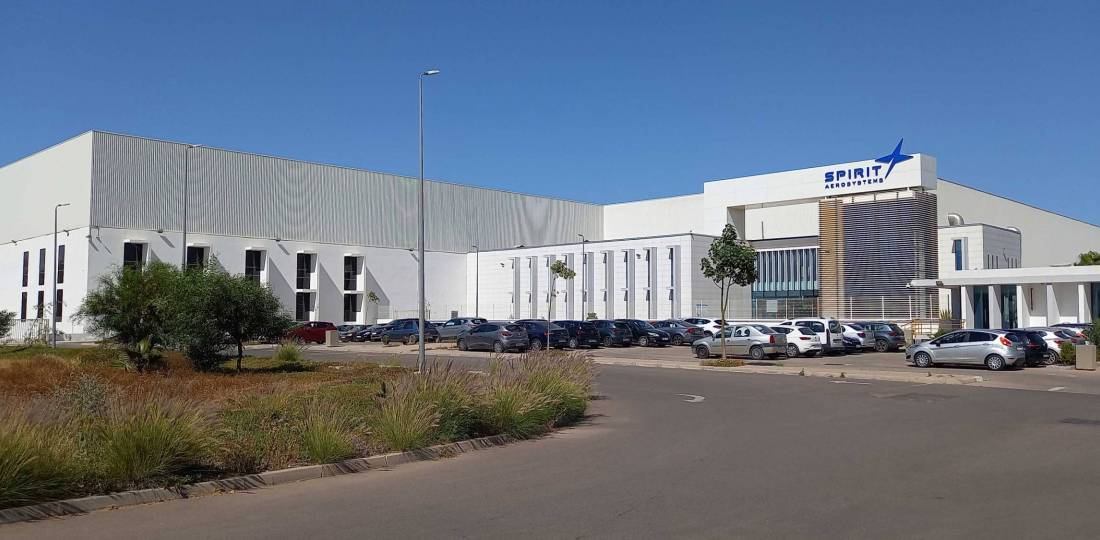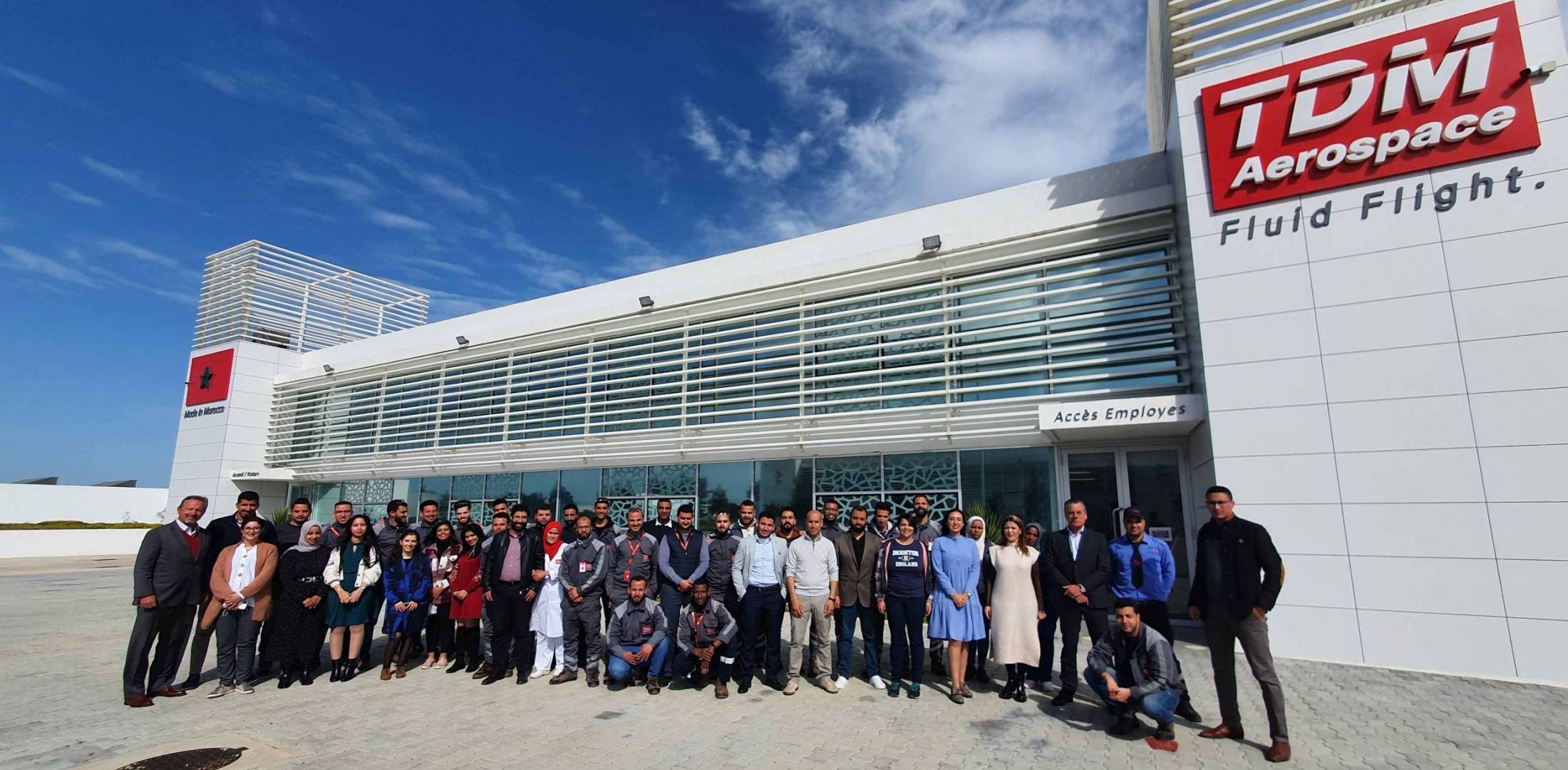Aerospace remains an important plank in Morocco’s international outreach to Europe and the U.S. In the seven years to 2021, its aerospace sector revenues more than doubled to $2 billion, jobs doubled to 20,000, the number of companies grew 40 percent to 140, and the percentage of local integration in aerospace products more than doubled from 17 percent to 40 percent, according to international investment promotion agency, Morocco Now.
“Top OEMs are using parts produced in Morocco, and many key industry players have built successful long-term partnerships in the country,” Morocco Now noted. “Morocco is the closest African country to the U.S., Canada, and Europe, ensuring on-time delivery and easy access to the main aerospace industry markets.”
Stephen Orr, v-p and general manager at Spirit AeroSystems Morocco, a former Bombardier facility acquired in 2020, told AIN that despite the challenges of the past two years, the company finalized the extension of its site by 150,000 sq ft, bringing the total site size to 250,000 sq ft. Today the site employs 300 people and the company is growing and looking for talented people to support its ongoing and future projects.
In September 2021, Spirit AeroSystems Morocco extended its manufacturing capability and product portfolio by starting production of the Airbus A220 aft and forward fuselage sections and the keel beam. The company also makes components for many Bombardier business jets and it supports MRO activities using original production manufacturing tooling for repairs.
“The overall Bombardier acquisition has been transformative for Spirit AeroSystems,” Orr said. “It strengthened our position as a tier-one supplier in the global commercial aerospace industry but also diversified our portfolio with additional Airbus content, more regional and business jet work packages, significant aftermarket work, and further defense capability.”
As a result, Spirit has transitioned to reporting its results in three key business segments, commercial, defense and space, and aftermarket. The company is refining its growth strategy, including at its Morocco site, and positioning to emerge stronger as the aviation industry continues to recover.
“Spirit is one of the largest fabricators of complex components in the world, producing more than 38,000 different detailed parts a day worldwide, and supporting commercial and defense customers,” Orr said. “We have developed an exciting roadmap of growth for our Morocco site and this will include complex structures for major aircraft platforms such as fuselages, engine nacelles, and more.”
Morocco boasts a young and competitive workforce, with 39 percent of the population between the ages of 20 and 45. It has developed ad hoc training centers with the help of investors, while the Arab nation produces 152,000 graduates a year. Morocco has also seen a growing number of partnerships with leading international universities.

“Our Spirit Casablanca site is strategically important to us,” said Scott McLarty, senior v-p of Spirit Aerosystems. “It provides a very competitive cost base, a highly skilled workforce, it gives us access to a very strong ecosystem, and it is ideally located logistically for our customers in the UK and Europe and for other destinations around the world.”
Casablanca’s TDM Aerospace, a fabricator of aerospace tubes and ducts, saw its business plan delayed by 24 months due to Covid but now forecasts an annual revenue capacity of $60 million to $100 million a year. Director general Lou Winoski told AIN the company now delivers to Boeing and Spirit AeroSystems and received an invitation to become a supplier to Airbus, with an RFP anticipated shortly.
“With respect to the Moroccan aerospace sector, we’re seeing positive signs coming out of the pandemic and associated industry malaise,” he said. “TDM was fortunate that, during Covid’s two years, we were still in our investment phase and not yet reliant on revenue. We managed to complete qualification on time despite unprecedented challenges.”
Winoski said Morocco hosted about 140 aerospace enterprises when the pandemic began and has emerged at the same level, attesting to the industry's resilience and stability, as well as strong underlying economic and demographic fundamentals. An effort by government and industry to work together proved a significant factor, as did the role of the king and supporting ministries.
“From my perspective, as in past downturns, it has been a painful time, resulting in a culling of the supplier herd and a hard look at core competencies at the OEM and tier-one levels, leading to increased opportunities for the survivors,” he said.
Pilatus Aircraft and Sabca Maroc, a subsidiary of Belgium’s Sabca Group, have signed a contract for the assembly of PC-12 aerostructures in Casablanca. The first fuselage and wing structure underwent assembly at a new Sabca facility and will be ready for delivery by the end of 2022. Training of assembly technicians has started in collaboration with the Institute of Aeronautical Professions.
“Pilatus trusted us after an international competition, in which we were able to demonstrate that Sabca Maroc was the most competitive and qualified in terms of quality, work capacity, but also confidence, motivation of the teams, and their ability to achieve this goal,” said Sabca CEO Thibauld Jongen, as quoted by Morocco Now.
Increasing the technological prowess of the aerospace industry remains a priority for the kingdom, which wants to obtain skills transfer from proven international partners. In March, Minister of industry and trade Ryad Mezzour signed a memorandum of understanding with representatives of Israel Aerospace Industries (IAI), stressing that the agreement responded to national priorities to promote advanced training, employment, local manufacturing, as well as research and development and innovation.
“As part of this partnership, Morocco and IAI have identified investment opportunities focusing on 3D printing, manufacture of cabin interiors, engine parts, and aerostructures, as well as the establishment of an R&D and engineering center and the development of an ecosystem of local suppliers through sourcing partnerships with IAI,” according to IAI.
